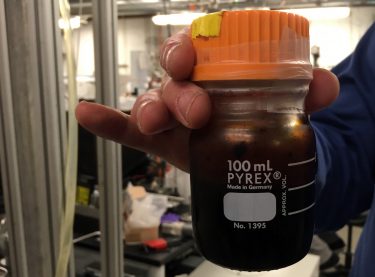
The mountain pine beetle has destroyed more than 40 million acres of forest in the western United States — an area roughly the size of Washington state.
The beetles introduce a fungus that prevents water and critical nutrients from traveling within a tree. They also lay eggs under the conifers’ bark, and their feeding larvae help kill trees — sometimes just weeks after the initial attack. Dead trees can fall at any moment or add fuel to wildfires, and scientists and land managers are left scrambling to deal with millions of these precarious giants. Harvesting the wood isn’t an option because the infestation stains it and causes the tree to crack inside.
A University of Washington team, including Environmental and Forest Sciences‘ Fernando Resende, has made headway on a solution to remove beetle-killed trees from the forest and use them to make renewable transportation fuels or high-value chemicals. The researchers have refined this technique to process larger pieces of wood, saving time and money in future commercial applications. They published their methods last month in the journal Fuel.
Read more at UW Today »
